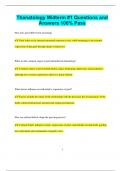Thanatology Midterm #1 Questions and
Answers 100% Pass
How does grief differ from mourning?
✔✔ Grief refers to the internal emotional response to loss, while mourning is the external
expression of that grief through rituals or behaviors.
What are the common stages of grief identified in thanatology?
✔✔ Common stages of grief include denial, anger, bargaining, depression, and acceptance,
although not everyone experiences them in a linear fashion.
What factors influence an individual’s experience of grief?
✔✔ Factors include the nature of the relationship with the deceased, the circumstances of the
death, cultural background, and personal coping mechanisms.
How can cultural beliefs shape the grieving process?
✔✔ Cultural beliefs influence rituals, expressions of grief, and attitudes toward death, guiding
how individuals and communities respond to loss.
1
,What is anticipatory grief?
✔✔ Anticipatory grief occurs before an expected loss, such as when a loved one is terminally ill,
allowing individuals to begin processing their emotions ahead of time.
How does the concept of death vary across different cultures?
✔✔ Different cultures have unique beliefs, rituals, and practices surrounding death, influencing
how individuals perceive and cope with mortality.
What role does support from others play in the grieving process?
✔✔ Support from family, friends, and community can provide comfort, validation, and
assistance, helping individuals navigate their grief more effectively.
What are some common misconceptions about grief?
✔✔ Common misconceptions include the belief that grief follows a set timeline or that one
should "move on" after a certain period.
What is the significance of memorial services in the context of death?
✔✔ Memorial services honor the deceased, provide a space for collective mourning, and help
survivors begin the healing process.
2
,How can professionals in thanatology assist those dealing with grief?
✔✔ Professionals can provide counseling, resources, and support groups, helping individuals
process their emotions and find healthy coping strategies.
What impact does sudden versus expected death have on the grieving process?
✔✔ Sudden death may lead to more intense feelings of shock and disbelief, while expected death
may allow for preparation and resolution of emotions.
How can personal experiences with death influence one’s perspective on dying?
✔✔ Personal experiences can shape beliefs, fears, and attitudes toward death, affecting how
individuals approach their own mortality and the mortality of others.
What is the role of rituals in the grieving process?
✔✔ Rituals provide structure, meaning, and a sense of community during times of loss, helping
individuals express their grief and honor the deceased.
What are some effective coping strategies for dealing with grief?
3
, ✔✔ Effective coping strategies include talking about feelings, seeking support from loved ones,
engaging in creative outlets, and practicing self-care.
How does unresolved grief manifest in individuals?
✔✔ Unresolved grief can lead to prolonged sadness, anxiety, difficulty functioning, and physical
symptoms such as fatigue or illness.
idea of limited resources ✔✔- we are familiar with the idea of limited resources when it comes
to time, money, fuel, etc.,
- we rarely accept that life itself is a limited resource
- We tend to view death as "unfair" but in reality it is neither fair nor unfair—we die whether we
"deserve" to die or not.
- death is the great "leveler."
What are some depictions of death in the media (T.V., movies, sitcoms, etc.)? ✔✔- Cartoons—
nobody really dies
- Movies—death often romanticized or seen as something to be overcome if you are strong
enough
- Some T.V. programs take a more "detached view" or a more "clinical" view—such as C.S.I. or
4




